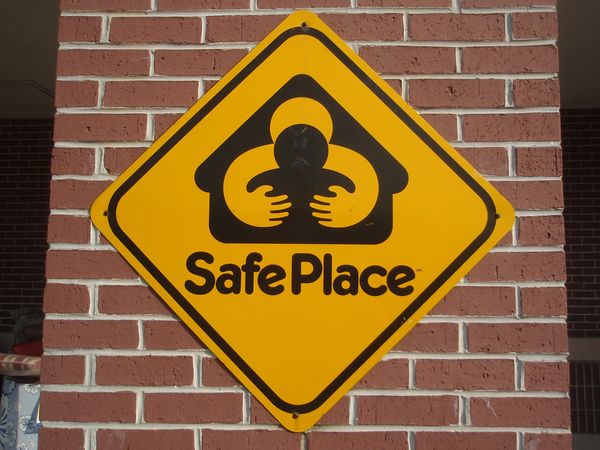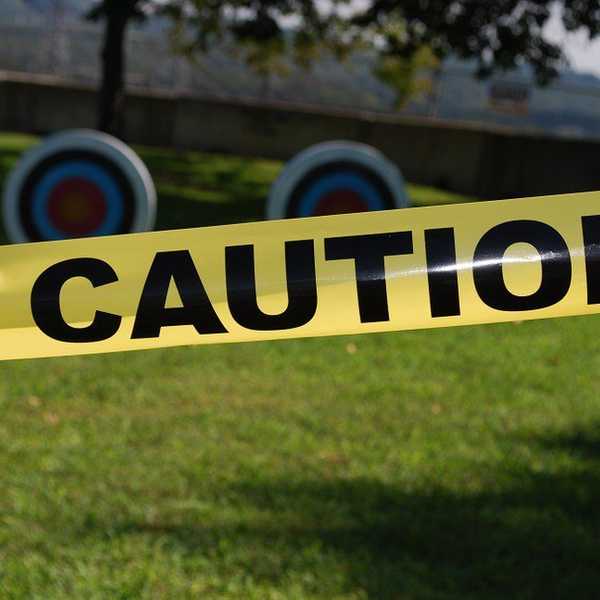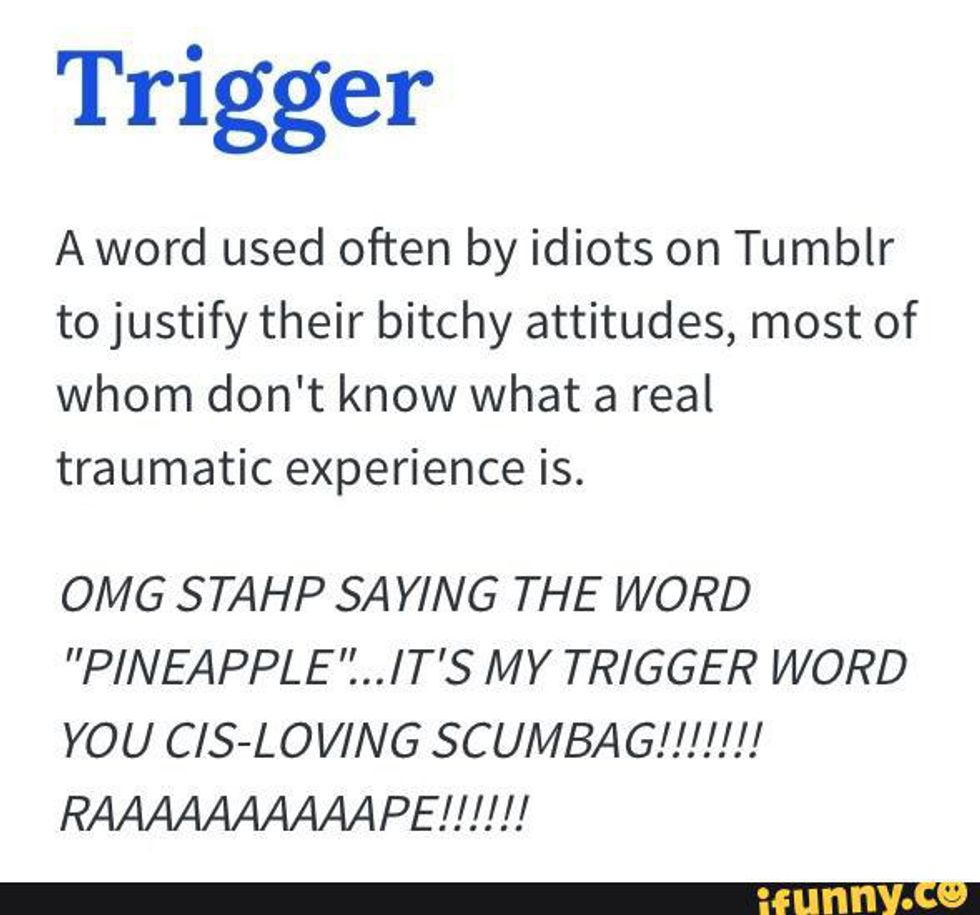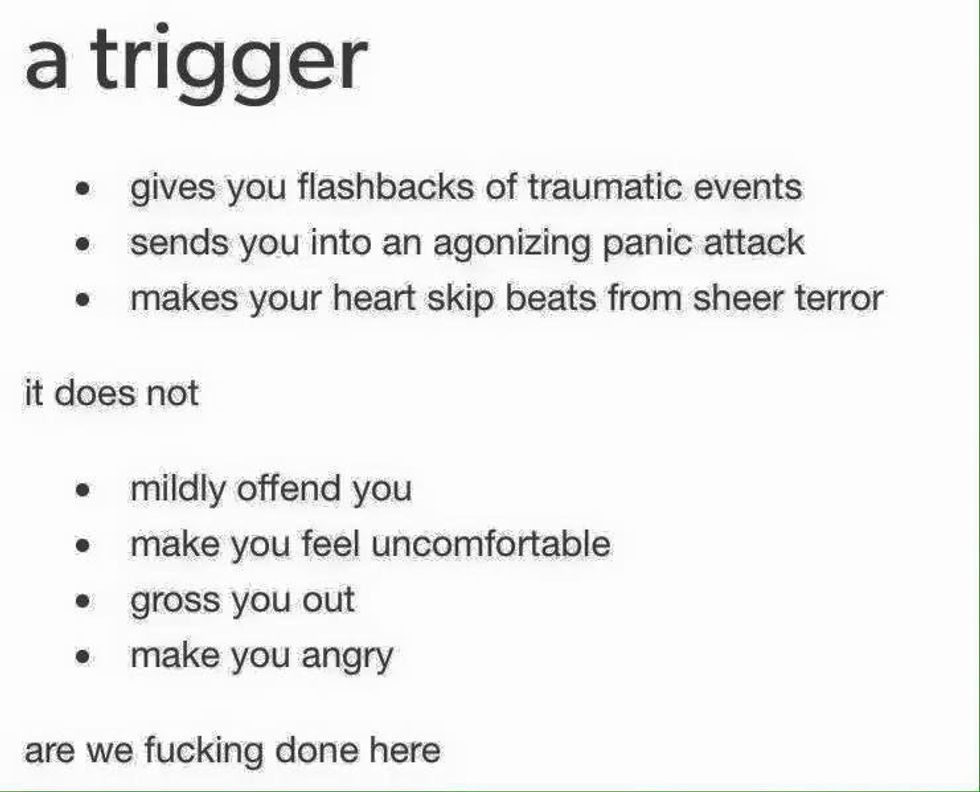A few weeks ago, a letter from a university surfaced the internet and caught aflame; in doing so, the flames attracted much attention and soon the University of Chicago's letter to the class of 2020 -- as in the incoming and current freshman class -- stating it doesn't support "safe spaces" or "trigger warnings" heated a debate about the true necessity of these spaces and warnings and the potential inhibitory nature they might have.
My initial reaction differs from where I stand now, even if just slightly, but to gain more perspective about the topic, I asked a few of my friends -- all with different political ideals and unique personalities.
When the University of Chicago was top-trending on the right side-bar of my Facebook feed, I was intrigued. When I saw the headlines array from top-to-bottom as I scrolled, I was appalled. How could a university completely ignore, disrespect, a person's vulnerability from a previous trauma? Trigger warnings are essential and safe spaces are important. How else are humans supposed to function in a learning environment without a threat to their personal and emotional safety? Immediately, I felt like an arrow had shot through a target on my chest; immediately, I made it about me and my feelings; immediately, I acted and thought in vain and selfishly.
I still stand by the idea trigger warnings and safe spaces are important. This being said, trigger warnings and safe spaces change in definition based on the person defining them and are open to interpretation based on the individual. To me, a proper trigger warning in a classroom setting presents there is sensitive material in the upcoming lecture/video/topic to be studied, yet it also explains the importance of reviewing such material and its relevance to the course.
I asked a close friend of mine about her perception of trigger warnings in the classroom, though she agreed she understood their purpose and could be beneficial, she presented her thought that it can potentially inhibit her learning environment as a student, especially within her field of psychology. When I asked her to elaborate and give an example, she explained in her abnormal behavior her professor was teaching about a sleep disorder and introduced an interesting documentary, but told the students to watch it on their own time because it had images and content that would scare or trigger students in the class with the sleep disorder. She also expressed that as students in college, we have the choice and opportunity to walk out of a class if it makes us uncomfortable and speak to the professor privately -- a trigger warning shouldn't be so broad of a topic that it should negatively impact a student's grade.
In my opinion, an entire classroom's lesson plan shouldn't be altered because of a person's sensitivity to a topic. Instead, the lesson plan should be altered for the specific student so there can be an optimum learning environment and the student doesn't feel threatened or feel the trauma previously experienced bubble back up into their memory.
Another close friend of mine has a strong religious person and lives her life as an awe-inspiring production and result of her incredulous faith. While reading people's opinions on trigger warnings and safe spaces throughout major online journalistic platforms, I read on article on how trigger warnings silence religious students. When I asked her if she felt this was personally true for her, she didn't feel so. I asked her more in-depth questions about how she felt about the connection between triggers and religion, she elaborated:
"With things like religion, you want people to be warned so they don’t feel ambushed, but not sugar-coated so they don’t understand. And I would never want a trigger warning to be subtly perpetuating the idea that religion or God is not good or not acceptable. There are problems in the Church, but I believe God is perfect. Which means His message or introduction needs no forward. A good example of watering down the Bible (basically trigger-warning it) is with the story of Noah’s ark. How many people tell that story and focus on the family and all the animals the Lord helped and saved, but don’t mention the 6 million he let drown. A lot of Christians don’t want to add that detail. I think Christians try to hide the sovereignty (overall power and authority) of God and just try to promote him as a sweet, distant, loving God who doesn’t care about your actions, but wants to make your life rich. God is jealous. He is wrathful toward sin. But he doesn’t ask people to hide those things. He is the ruler of all things so in order to acknowledge him as God you have to see that His way is right and up to Him. I would never want to trick my friends into hearing about the lord and so sometimes I will “trigger warn” them like “hey I’d like to come to a bible study” or “this sermon is on sexual immorality so brace yourselves” I do that so my friend’s have a clearer view of the God they hear about. God hates sin, very much so. But God loves His people. He can do what he likes with them because they are His. WHICH is why Jesus is crazy, because he is God’s way of saying, I can do whatever I like, I don’t need mankind to sustain me, I don’t need to fix the broken mess humanity has made of the world, but I CHOSE to. I’m not sure I’m explaining this well, but religious material should never be sprung on someone. I don’t hide that I’m a Christian just so I sneak in the bible later on in conversations. But I don’t want my warning to dissuade anyone from further exploring religion or religious texts. So I try to tell the truth."
She felt similarly as I do about trigger warnings in respect to the classroom, stating in a trigger warning, it should be expressed that “this isn’t taught to scar you or guilt you or send you to counseling its to get you to think about yourself, you community, your interactions with others, etc."
In respect to safe spaces, my friend of faith agreed they were important as students need a place where they can talk about hurtful experiences or painful topics. However, my other good friend studying psychology disagreed, saying safe spaces were a waste of time. I personally stand somewhere in the middle. There are some "safe spaces" on my own campus that I personally felt were unhelpful and I felt like I was being inspected inside of a box, instead of feeling safe and comfortable.
I asked another friend of mine how he felt about safe spaces to get a male perspective and he expressed how the idea of safe spaces can be tricky because it depends on each person's concept of what it is.
"...for example I feel safe and comfortable at AGR [Alpha Gamma Rho], but some people don't like fraternity houses so I think that it's very variable from one person to another. So I guess I think if someone doesn't have a place they feel safe there should be a-no-questions-asked place where they will help you no matter what, like a guidance building or something."
Like anything else in this world, trigger warnings are abused by people who simply don't have the maturity to talk about challenging topics or want their sensitivity to be protected. Like anything else, trigger warnings are real for people with actual traumatic experiences and sensitive material being sprung on them can actually severely impact their learning experience and ability to focus. People are insensitive and it's easy to say trigger warnings are dumb when you've never been put in a situation where sensitive material was presented without a heads-up and you sat in class, tuned-out just replaying images of that traumatic experience over and over. It's easy to say they're useless when you've never felt fear wash over amidst a place where you usually, and are supposed, to feel safe.
Takeaway #1: trigger warnings are important. Without a proper warning, the material can be graphic or sensitive enough to send a person with personal traumatic experience into an anxiety or panic attack or seriously trigger forms of PTSD, resulting in their own mental inhibition to learn and perform well academically. However, they need to be utilized correctly to not shame people into not talking about difficult topics or narrow the spectrum of academic freedom.
Takeaway #2: Everyone should have a place where they feel comfortable and safe on campus. Whether it's a designated building or a connection they build within a circle of trusted people is up for interpretation. I personally believe it should be a student's responsibility to seek this out on their own as part of their personal experience and development within the university. It's important to have enough self-discovery and exploration to find people and place you feel comfortable amongst during the undergrad strife and tribulations.
More encouraged reading (mostly opinion) on the ideas and debate around trigger warnings and safes spaces:
The debate about trigger warnings and safe spaces isn’t really about free speech, The Washington Post
Trigger Warnings, Safe Spaces and Free Speech, Too, The New York Times
























